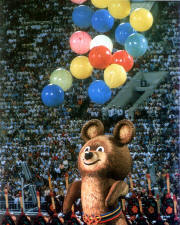A man is standing on scene. He holds in hands enormous air telephone. He should make fun but he's sad. And all ex-Soviet Union likes him.
His name is
Slava Polunin and he has his own show called Snow Show.

Jerry Tallmer,
The Villager:
"Slava’s balloons work better than those at the Democratic Convention. They’re also bigger — just this side of Zeppelins.
They rain down on stage and audience as Slava and his colleagues are taking their bows during the huge (dry) snowstorm that ends “Slava’s Snowshow” — at least they did in the video from Paris that preceded the Russian mime and his company’s August 24 arrival at the Union Square Theatre on East 17th Street.
Slava is the one in the da-glo egg-yellow bathrobe and big furry brick-red carpet slippers. During the show he may or may not hang himself, may or may not be pierced with arrows like Saint Sebastian, may or may not dance with a mannequin, may or may not get himself enmeshed in a giant spider web of gauze, may or may not don a top hat as smokestack and tootle around like a choo-choo train.
“The show is constantly changing,” he said some days ago from his and his wife’s house outside Paris. “So is the troupe. It’s full-time improvisation. Often we don’t know who plays which role until we get to the theater.”
A translator, on the line here in New York, put all this into English. But Slava understood. When she, the translator, was conveying Slava’s encapsulation of what he does as “a combination of metaphysics, tragedy, and comedy,” the snowman broke in (in Russian) with: “ . . . and poetry.”
Blame it all on Charlie Chaplin.
Some of the largest and fiercest tank battles of World War II took place in the Orel-Novosil area in 1943.
Slava Polunin, whose parents were “in commerce” — sales clerks in a toy store — was born in Novosil, “a little village 60 kilometers from the city,” on June 12, 1950.
“In 1960, when I was 10 years old, I was watching on television the movie ‘The Kid’ [Charlie Chaplin, Jackie Coogan, 1916]. My mother came into the room and turned it off. I cried till morning.”
Later, in his 20s, Slava would get to think that Buster Keaton was an even greater silent-film actor, in short, a mime, than Chaplin, but in any event the damage had been done.
“When I was 12 years old I started performing, first with friends, then in school, then to the big city, and then in 1967, when I was 17, I decided to leave my little village and go off to mime school [instead of the family’s aim for him, engineering school] in St. Petersburg.”
A famous movie, “Les Enfants du Paradis,” had already (1945) established the primacy of Etienne Decroux and Jean-Louis Barrault in the universe of mime, and Marcel Marceau was soon to walk in their tracks (leaning against the wind, which Slava, mercifully, does not do).
“French pantomime and English pantomime were the second stage of my education,” he says over that phone line. “The third stage was folk art and commedia dell’arte and jester [perhaps a mistranslation of ‘gesture’?]. And the fourth stage was the avant-garde of Artaud and Tina Bausch and Robert Wilson.”
Underlying the whole gestalt is, he said, the ancient Slavic skoromokhi, a performance broth of clowns, minstrels, mummers, buffoons, dancers, puppeteers, magicians, songmakers, tale-tellers, and animal acts.
Slava founded his first mime troupe, Litsedei, in 1978; would lead it around Europe in what he called the Mir (Peace Caravan) for six months in 1989. By the 1990s he felt the need of a refresher course in up-to-date clowning, so he spent two years touring with Cirque du Soleil, including a hitch in New York.
“Slava’s Snowshow” came out of all that with a hit London booking in 1993.
His travels have left him, he says, “well versed in global show culture,” not least the culture of the Blue Man Group and the brilliant fool-mooning of Bill Irwin and David Shiner, witnessed three years ago in Moscow.
Now about that rope — the one sad-eyed Slava loops around his neck at the beginning of the show, only to haul a fellow mime in by it from the wings. More than a little touch of “Waiting for Godot,” it might be thought.
“Well,” says Slava Polunin, “I adore Beckett, but I do not subscribe to his philosophy, which is that of impasse. Mine is of joy and happiness, even if tragedy is also a crucial element. A lot of my shows are actually conceived as counter-Beckett.”

Counter-Beckett and counter-disaster. He has entertained in Kiev during and just after the Chernobyl nuclear wipeout, when all other theaters in the vicinity were closed; in Moscow, during the Czechen takeover of the Dubrovka Theater that left 129 people dead; in Berlin, outdoors, at the Wall, when the Wall was coming down.
If, at Union Square, someone a bit smaller than Slava comes out on stage holding a fish in her hand, that’ll be his wife Lena Ushakova. Their son Ivan is an actor; their son Dmitri is a technician. It’s all in the family, or, as they say in Novosil, snow news is good news."
Blue Canary is the main theme in SnowShow. Then and now.
Fiorino - Blue canary.mp3Jorge Ben - Mas Que NadaPLEASE! TRY TO DOWLOAD - I'M TRYNING BADONGO HOST -) THNX





